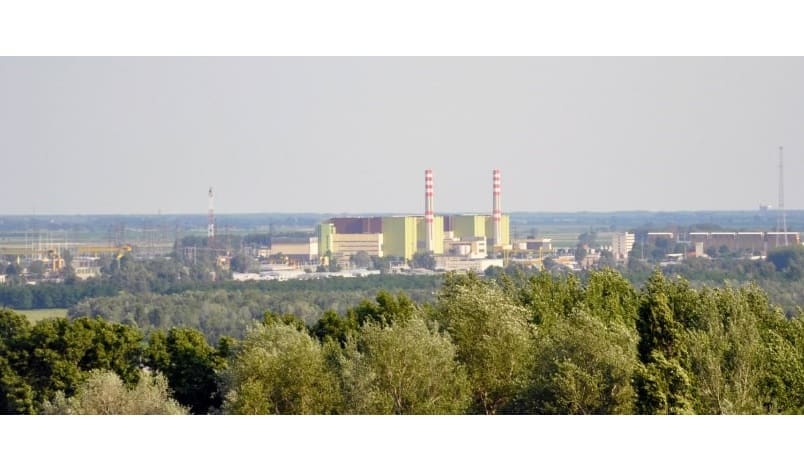The Paks Nuclear Power Plant is the only power plant operating in Hungary. It is responsible for generating about 35 per cent of all the electricity the country consumes a year. Largely thanks to Paks, about 65 per cent of Hungarian electricity production is carbon neutral, of which 80 per cent is generated in Paks.
The VVER-440 Model power plant was built during the state socialist period following Soviet design and safety standards, from 1969 to 1987, with the purpose of functioning for about 30 years. As the lifetime of the power plant was coming to an end in the early 2000s, Paks’ license was extended by another 20 years—thus, it will expire in the mid-2030s. As with the decommissioning of the power plant, Hungary would lose out on a strategically important source of its sovereign energy generation, for the past couple of years, there has been public debate, as well as actual work done, on both expanding Paks with new nuclear reactors as well as extending the currently operational Paks reactors’ lifespan with another 20 years. In a recent effort to increase the stable supply of needed materials to the power plant, the Hungarian parliament came out in support of allowing Paks to use alternative fuels in the reactors in addition to the Russian-supplied ones.
The decision came as an attempt to reduce the country’s dependency on Russian energy,
and to diversify the energy resources Paks can rely on. Among the nuclear power plants that were built using Soviet design, such as Paks, it is not uncommon to use fuel supplied by Russia. Currently, there are 16 operational VVER-440 reactors within the European Union, for instance, in Czechia and Slovakia, some of which still rely on Russian fuel supplies. Understandably, the war made it difficult for fuel to be transported from Russia to the city of Paks. Before the war, Russia transported fuel to Hungary through Ukraine; however, since February 2022, the transportation has been going through the Black Sea and then on rail from Bulgaria to Hungary.
The recent decision of the Hungarian parliament to allow for diversifying the source of Paks’ fuel may secure a stable supply of the necessary material for the plant to safely function. Please note, however, that Budapest did not officially change its supplier of fuel, what is more, Budapest disclosed that it is dedicated to keeping Russian supplies coming as long Moscow is capable of providing them steadily and reliably. Still, clearly, the recently debated legislation is an attempt to seek alternatives to Russia.
The issue of supplying fuel to Paks is not entirely separate from the question of expanding the nuclear power plant with new reactors, which are commonly referred to as ‘Paks 2’.
Paks 2 was launched as an intergovernmental agreement between Russia and Hungary in January 2014 to supply two new reactors to Hungary by the Russian nuclear energy company Rosatom. Given the initial agreement between the two sides, the project is supported by a Russian state loan that covers about 80 per cent of the project’s expenses. As circumstances have considerably changed in the nine years following the initial agreement, in April 2023, the financing and construction contract was modified by the two parties and was submitted to the European Commission for clearance. The EC’s clearance was granted about a month later, giving a green light to the project. Not only the amendments to the contract, but also the expansion project as a whole was also given a green light by the EC in 2017 after a long examination of the proposal.
MVM Paksi Atomerőmű Zrt filmje
Bemutatjuk a IV. Palkonyai Dűlőfutás egyik kiemelt támogatóját.
Amidst growing worries about the reliability of the needed supplies due to the war, Hungarian Minister of Foreign Affairs and Trade Péter Szijjártó reassured the public that Hungary has fuel rods in reserve. Together with Alexey Likhachev, the Director General of Rosatom, Szijjártó visited Paks in November this year to review the progression of the Paks 2 project. Szijjártó announced that the companies working on the expansion are expected to complete the construction of about 60 buildings within the next half year, while groundworks are already underway for the new reactors.
The construction of the new plant is yet to be seen, however, as some expect the sides to withdraw from the agreement due to the war and the international sanctions. However, it is important to emphasize that,
as of now, the 11 sanction packages include no ban or restriction on nuclear energy, while the Hungarian government also stated numerous times that it would oppose such sanctions.
Despite the rumours about the expected breakdown of the cooperation, Alexey Likhachev also emphasized at the press conference that the two nuclear reactors are expected to be finalized and become operational in the early 2030s, before the currently functioning Paks reactors’ lifespan is over.
Albeit the expansion is flagshipped by Russian participation, over 90 companies are participating in the project, many of them from the USA, Germany, and France.
Since early 2022, the involvement of French companies in particular in the construction project has been significantly increased.
The control hardware of Paks 2, which Szijjártó called the ‘soul’ of the power plant, as Hungarian Conservative reported earlier, is being manufactured by a French-German consortium. However, as the German government did not approve Siemens Energy’s contribution to the project, Szijjártó negotiated with a French company, Framatome a couple of months ago in relation to increasing its input to manufacture the control equipment for Paks. Unsurprisingly, when information about the Hungarian parliament’s recent decision to support the approval of alternative fuel sources to Paks reached the press, the French Framatome also confirmed that it is going to cooperate with Hungary on this front too.
Related articles:








